Analysed: Winks' maturity shows great promise for Spurs
Spurs left it late to come from behind against West Ham - but their newest young star was quick off the mark. Seb Stafford-Bloor was in the White Hart Lane press-box analysing it with our FREE Stats Zone app
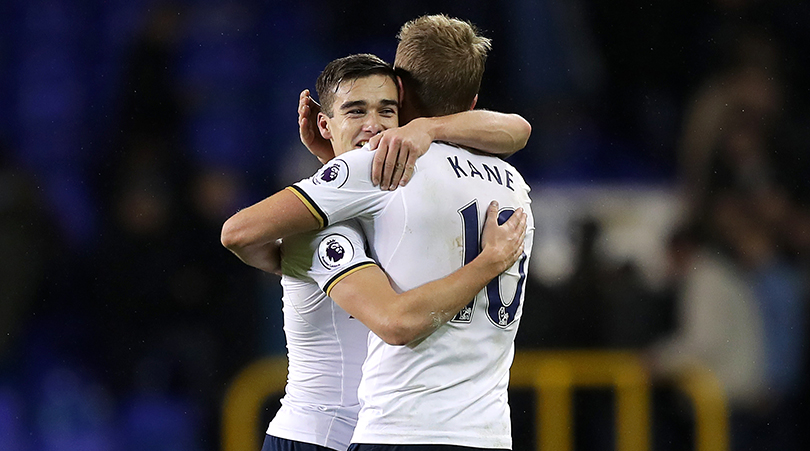
International breaks are rarely convenient, for supporters, players or managers, but for Tottenham and West Ham the most recent hiatus came at a particularly inopportune moment. Spurs had produced their most encouraging performance in weeks during the 1-1 draw with Arsenal at The Emirates and West Ham, so disappointing this season, had taken seven points from a possible 12. It's the middle of November and definitive moments are still some way off, but this London derby was still a fork in the road, channelling the respective sides towards or away from the objectives.
Saturday’s game at White Hart Lane was football at its most contrary: West Ham raised their level, Spurs dropped theirs and yet it was Slaven Bilic giving the crestfallen press-conference at full-time. His team had thrown away a throughly deserved lead inside five minutes and managed, somehow, to emerge with nothing from one of their best showings in months.
Mauricio Pochettino was buoyant, though. With the win, the improbable escape from defeat's jaws, and with his newest young star.
Wise Winks
The Argentine gave a first Premier League start to Harry Winks, the 20-year-old midfielder and latest academy graduate. With Toby Alderweireld and Erik Lamela still absent, and Dele Alli and Heung Min Son only fit enough for the bench, Pochettino again shuffled his personnel and formation. Winks began in a rotating midfield-three alongside Mousa Dembele and Victor Wanyama, with Eric Dier dropping into a back-four next to Jan Vertonghen, and Harry Kane starting behind Vincent Janssen in the No.10 role.
Winks is potentially a fascinating player, built as he is from Tottenham DNA. With his light touch and determination to be expressive, he enjoys a neat synergy with his club's traditional ideals: he plays the game, as Spurs fans might say, in the "right way" - all touch and technique, poise and vision.
Often, it's possible to tell quite a lot about a footballer from his first significant touches in the professional game and, though Winks has made Premier League appearances from the bench, the liberty with which he began his full debut was startling. He quickly settled into a passing rhythm, showing for the ball regularly and pushing it about freely; Pochettino may have created an environment which emboldens young players, but they are individually responsible for taking those opportunities.
Get FourFourTwo Newsletter
The best features, fun and footballing quizzes, straight to your inbox every week.
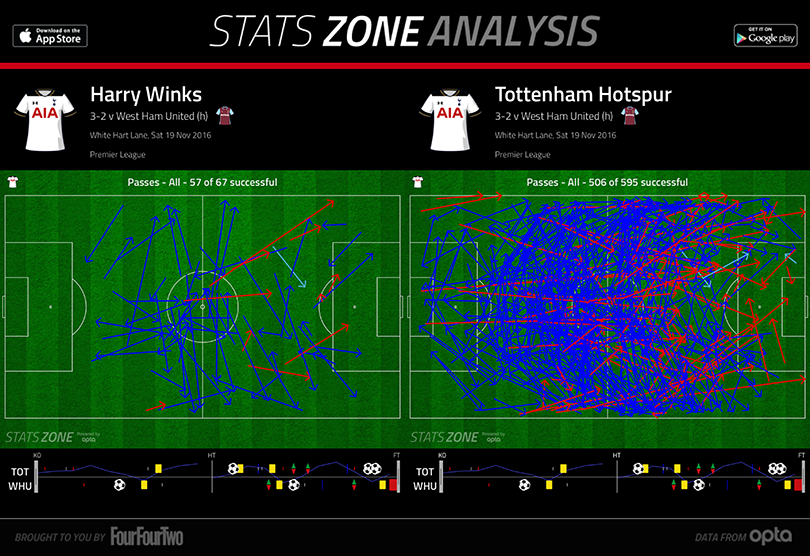
Inside the first 15 minutes, Winks grasped his. Completing all of his first 12 passes, he guarded possession smartly and explored West Ham's vulnerabilities from the off. A neat inside ball created an early shooting chance which Christian Eriksen neglected to take and, minutes later, he threaded Kane into the box with a well-disguised through-pass.
A common issue for younger players is the speed of the professional game and its inhibiting effects: either they shrink from the physical challenge or, more often, they lack the clarity of thought to make decisions quickly or definitively enough and, consequently, either retreat within themselves or drown in the moment. The lights were quite clearly not too bright for Winks, though, and there was little sense of him trying to gently play his way into the occasion. He didn't just want to keep the ball, he wanted to use it.
Mixed fortunes
Tottenham didn't start well on Saturday night. The Kane/Janssen axis, on only its second outing, failed to function properly. While Spurs' build-up play was neat enough and they did often succeed in freeing both of their full-backs in advanced areas, the front two didn't destabilise the visiting back four nearly often enough.
The front pair’s off-the-ball runs didn't complement each other and, ultimately, they combined only to narrow the passing options of the players behind them; the moments of genuine penetration were scarce. The game was eventually won and the points were banked, but the 3-2 win was more of a superficial triumph than an outright success. Tottenham certainly have form to recapture.
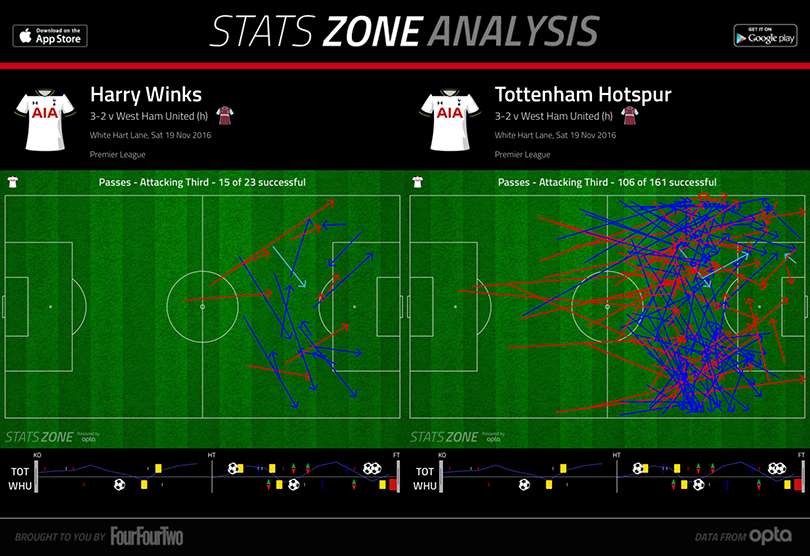
But it's important to separate Winks from those frustrations and to contextualise his performance. He scored the first equaliser, of course, tapping in after Darren Randolph had made a splendid save from Janssen, but his greater worth was in the consistency of his temperament and how willing he was to influence the game - even after Tottenham had fallen behind for the second time and the north London air had grown thick with anxious irritation.
In those conditions, it must be tempting for inexperienced players to retreat out of sight and away from the crowd's disdain. Winks didn’t: he actually became more visible as the match intensified and the pressure to deliver increased. That's what makes him stand out: not shiny veneer, but emotional substance.
Excuses are sometimes made for developing players and they're often allowed greater latitude on account of their youth, but this wasn't a false positive and Winks was impressive in more than just relative terms. The basic statistics bore that out, with him completing 57 of his 67 attempted passes, including 15 of 23 inside the attacking third, while also equalling team highs in interceptions (2) and successful tackles (2).
However, this was ultimately a display garnished with eye-catching intangibles. At 2-1 down and then, later, with the game tied and Spurs chasing a winner, it was their least experienced player who drove them forward.
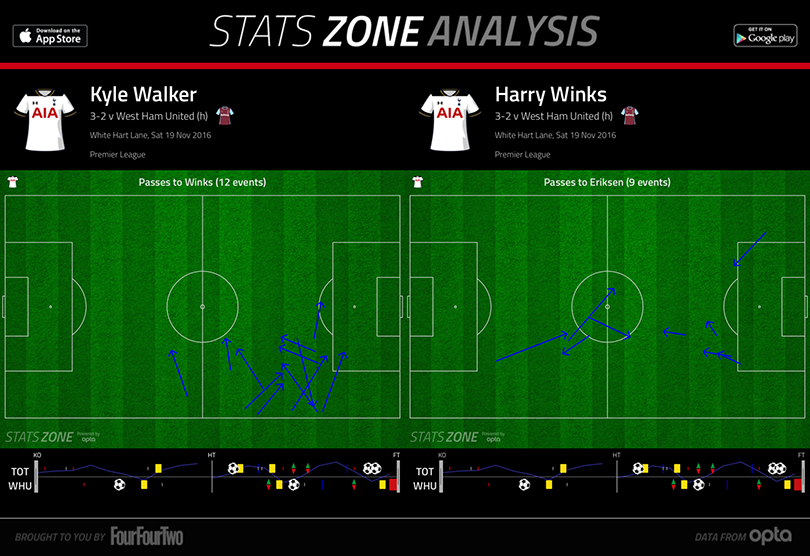
The young leader
Winks began the move which ended with Kane equalising, driving possession up the field, and also started the phase which resulted in Heung Min Son being scythed down in the box for the decisive penalty, ending a West Ham break with an interception and keeping his team's foot on their opponent's neck. This wasn't just a player being neat, tidy and attempting to get through his first full 90 minutes without making a mistake, but one unusually comfortable in the rarefied air of a finely balanced derby.
It was a mature performance, but also a complete one. Passing percentages and equivalent statistics are only really of worth if they outline a true purpose and it's tellingly easy to illustrate Winks' function within the 3-2 win. He received more passes out of defence than any other Spurs midfielder - 12 from Walker, 9 from Rose and 8 from Vertonghen - and reliably infiltrated the West Ham half with his combinations with Eriksen (9 passes given), Dembele (5), and Janssen and Kane (3 each).
What next - proclamations of greatness and the fast-track into the England team? No, put the anointing oil away. Winks is unusual in temperament and plays with an intoxicating blend of heart and skill. Where he goes from here will be proven in time but, wherever that may be, it seems certain to be a journey worth watching.
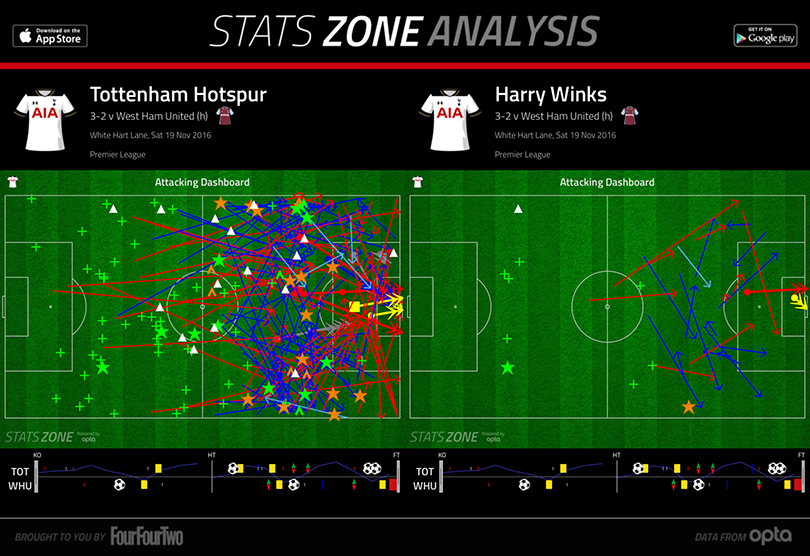
Match facts
- Since the start of last season, Spurs have picked up 20 points in London Derby games in league competition, the most of any side involved.
- Harry Kane has netted in each of his last 4 Premier League games; equalling his joint-best scoring streak in the competition.
- Of players to have played in 10+ London PL derbies, Harry Kane has the best goals/game ratio (0.82, 18 goals in 22 games).
- There were 160 seconds between Harry Kane's two goals for Spurs against West Ham.

- Michail Antonio has scored 11 headed goals in the Premier League in 2016, more than twice as many as any other player in the competition (Sergio Aguero and Christian Benteke next, on 5).
- Antonio has equalled the Premier League record for headed goals in a calendar year (11, joint with Tim Cahill in 2010).
- West Ham have received more red cards than any other Premier League team since the start of last season (7).
- Harry Winks is the first player to score on his full Premier League debut for Spurs since Eric Dier in August 2014 (also v West Ham).
- Spurs conceded more than once in a Premier League game for the first time this season.
- Mike Dean has awarded 9 penalties in the Premier League this season, more than any other referee.
STATS ZONE Free on iOS • Free on Android
Seb Stafford-Bloor is a football writer at Tifo Football and member of the Football Writers' Association. He was formerly a regularly columnist for the FourFourTwo website, covering all aspects of the game, including tactical analysis, reaction pieces, longer-term trends and critiquing the increasingly shady business of football's financial side and authorities' decision-making.
